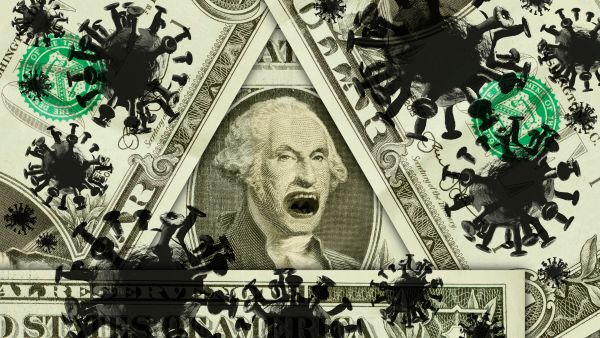The world has always witnessed major political, economic, and social changes following pandemics, and the coronavirus doesn't seem to be an exception.
I’m calling on the Federal Government to nationalize the medical supply chain.
— Andrew Cuomo (@NYGovCuomo) March 22, 2020
The Federal Government should immediately use the Defense Production Act to order companies to make gowns, masks and gloves.
Currently, states are competing against other states for supplies.
As it continues to target more people, the novel coronavirus pandemic is expected to drastically change the future of humanity as we know it today, and capitalism seems to be particularly on stake.
With major criticism targeting several governments east and west for not providing citizens with the appropriate healthcare services required to limit the number of victims, more and more countries are starting to take unprecedented measures not only to tackle the health crisis but to also prevent a looming economic collapse, which threatens the very basis of capitalism.
Markets across the world have been witnessing significant economic meltdowns pressured by flight suspensions, plunging oil prices, and major world cities being under complete lockdown over the last few weeks.
Italian government to take control of Alitalia: draft decree https://t.co/ZxzuXz8hKq pic.twitter.com/5LzlEuiL6w
— Reuters World (@ReutersWorld) March 16, 2020
In Italy, the country hardly struck with COVID-19, scoring the highest death toll in the world up till now, the government was left with no choice but to rescue the country's flagship airline carrier Alitalia, by nationalizing it.
Being the second-worst hit country in Europe, Spain, has taken the decision to nationalize all hospitals, hoping that this can help the government manage the health crisis, it wasn't so prepared for.
Similarly, French Finance Minister Bruno Le Maire, has recently promised generous government support for major French businesses, that might suffer the critical impact of COVID-19 emergency, naming BNP Paribas Bank, Renault, in addition to Air France. He also used the word "nationalize" while referring to necessary efforts that can rescue the private sector.
Even in the UK, where a conservative government has just been formed a few months ago, the government has been effectively nationalizing parts of the private sector, at least temporarily. Notably, the Chancellor of the Exchequer pledged more than 4 billion pounds to cover about 80% of the salaries private sector's employers have been unable to pay due to the coronavirus outbreak. The British government has also announced a business bailout package worth £350bn to shield different businesses from going bankrupt amidst lockdowns.
When the going gets tough in public health—in the midst of genuine crises—we don’t trust markets. We can’t. Coronavirus: Spain nationalises all private hospitals, enters lockdown - Business Insider #COVID19 #Elections2020 #healthpolicy https://t.co/uVB4gjUZUZ
— Dr. Brent Epperson (@BrentEpperson) March 17, 2020
On the other hand, US President Donald Trump rejected calls, made by New York Governor Andrew Cuomo and the mayor of New York City Bill de Blasio, to use the Defense Production Act to temporarily nationalize businesses manufacturing medical supplies crucial for treating COVID-19 patients such as masks, gowns, and ventilators. His argument was that "such moves will lead to an economic model similar to that of Venezuela", which he explained: "didn't work for them".
The conversation regarding capitalism's role during the coronavirus outbreak in the US, has also included heavy criticism of the country's long-term reliance on private health insurance companies, that have kept the needed health care beyond the reach of the poor and disadvantaged segments of the population.
Trump rails against the idea of nationalizing businesses, invoking Venezuela where the business class has devastated public sectors by siphoning off billions from state-owned companies, which leaves the country's hospitals less equipped to deal with a pandemic pic.twitter.com/B5YjbEzX8C
— Alex Rubinstein (@RealAlexRubi) March 22, 2020
This growing tendency to link measures taken by western governments, to tackle the coronavirus' health and economic outcomes, with capitalist policies, has been fueling the question of whether capitalism has failed to face the biggest pandemic challenge of the 21st century. More importantly, will the survivors of today's emergency try to develop new economic systems; ones that can be more resilient in the face of the next global catastrophe.







